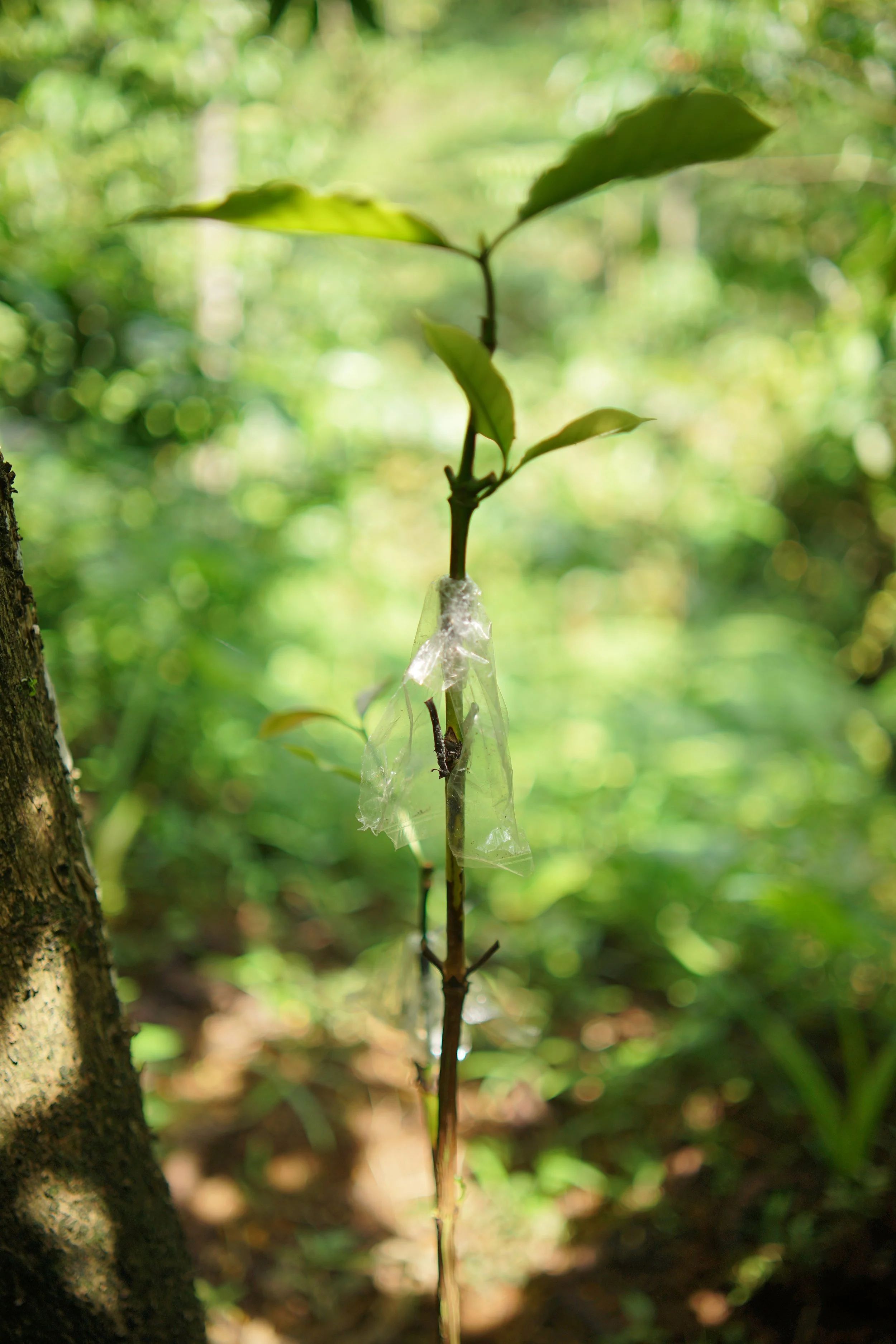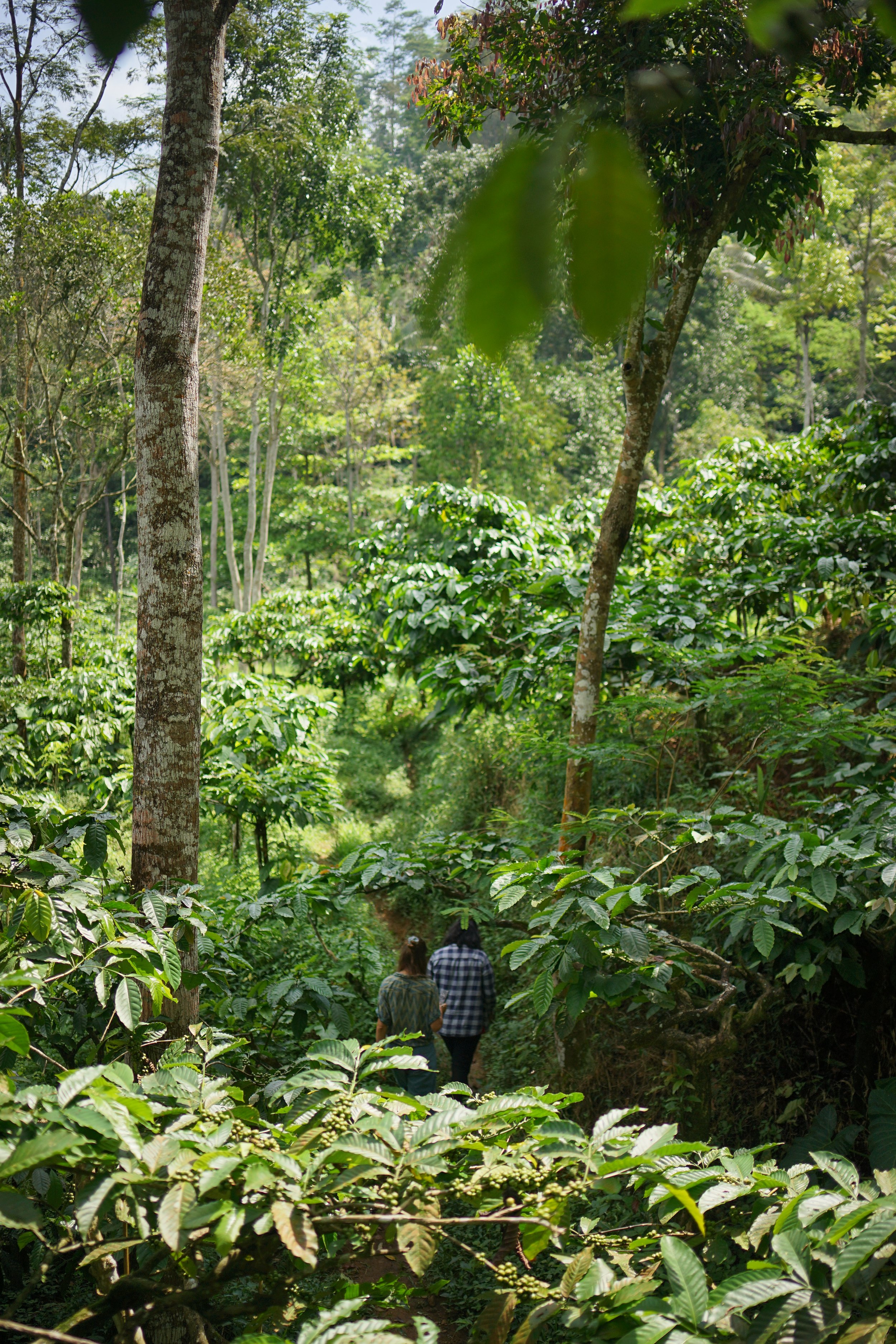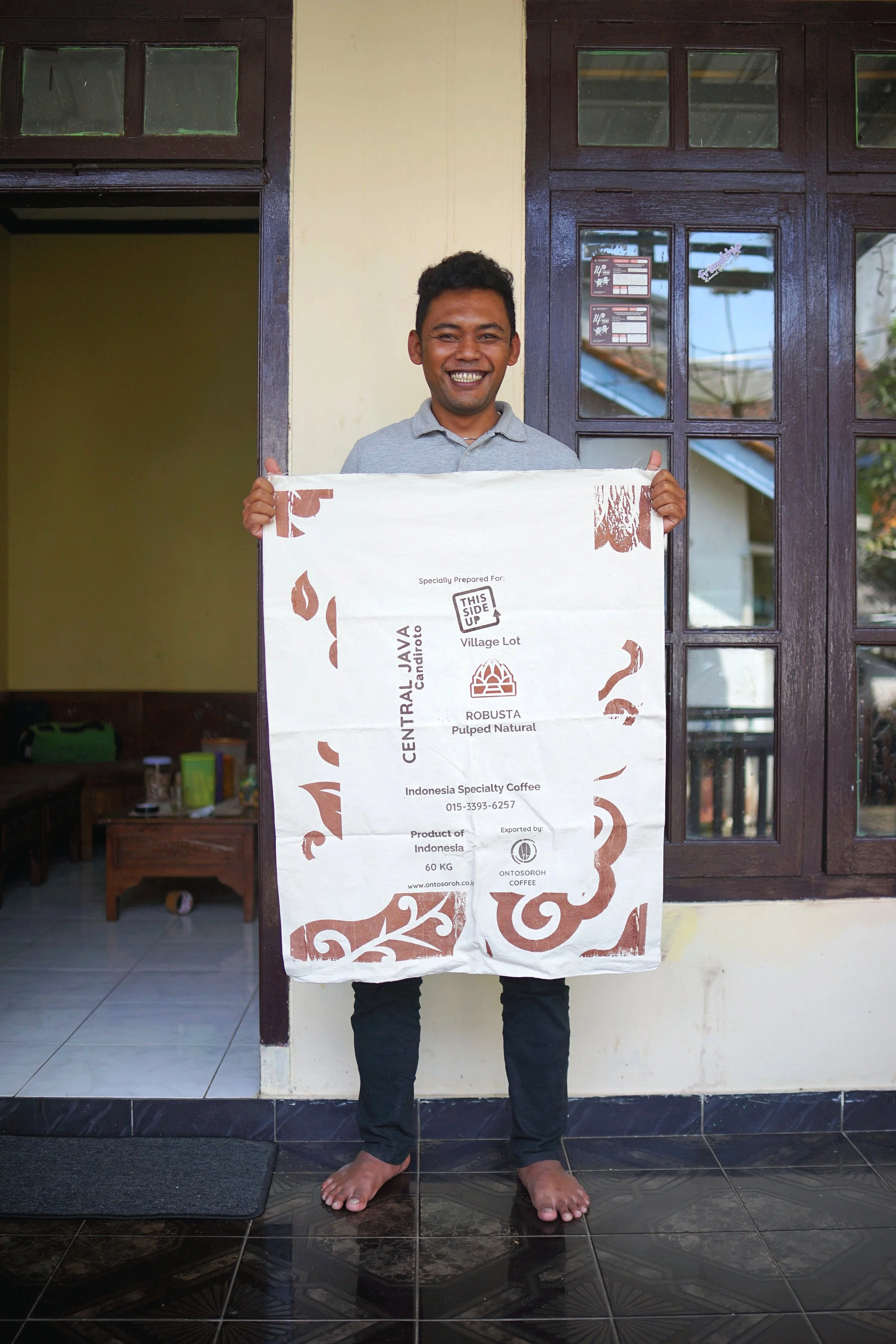SINDORO AND CANDIROTO
Coffee is the smoking gun
Located between Mount Sindoro and Mount Sumbing is the home of 2 groups, Kojoyo cooperative and First Light coffee.
Farmers from the Kojoyo cooperative predominantly produce arabica and are spread across 6 districts in Temanggung region. Out of which 4 districts made of 250 farmers produce specialty arabica. This cooperative is headed by Wahyu Setiono who has many accolades to his name. Majored in theology, Wahyu orrginally wanted to become a priest!
In 2019, when he was a coffee trader, he came across the wonderous world of processing coffees in so many different ways. Around that time, he also entered a coffee competition with his robusta and it ranked 11th in the list. Through these events, he had the opportunity to taste coffees from across the world that was also inspired him to dip his toes into this realm. He felt he was more than capable of trying and mastering these different methods himself. He started getting serious about processing coffees and strongly believed it is a form of art that needs to be structured and detailed. He underwent training on cupping, processing both basic and advanced levels with a teacher from Java Legend, an Indonesian coffee school that specialized in farm to cup education.
Wahyu founded Kojoyo in 2019 with an intent to make economic impact for farmers that were interested to produce specialty coffee. This region because of it’s altitude specializes in Arabica and very little robusta. Along with his experience, his thoroughness when it came production, processing protocols, quickly made it possible for them to start becoming profitable. In 2020, this coop added a new mission, partnering with Indonesia’s Counter Terrorism Body (BNPT), to counter Islamic radicalization agenda by empowering farmers and rehabilitated terrorists on the area the chance for self employment through coffee cultivation and coffee tourism. Out of 250 members, 5-6 of them are ex-imprisoned radical Islamic terrorists who have now turned coffee farmers, thanks to Wahyu! Currently the government has dedicated 100 hectares of land for this project out of which 30 are productive with speciality coffee and expanding the rest in the coming years.
Another big bad wolf in this region apart from breeding grounds for terrorism is cultivating tobacco. Not only is it nherently destroying the environment but since the demand for tobacco has reduced drastically, it leaves behind the farmers as usual to find other ways to survive. Kojoyo was also born because of this reason, to support as many farmers in this region to switch from tobacco to coffee and to grow it in a sustainable way. By growing coffee organically, it allows them to replenish the land and also improve their livelihoods simultaenously. For Wahyu, coffee is a tool that allows farmers to come out of these disadvantaged situations. Lastly, this region also was privy to 2 cyclones last season and in general unpredictable weather patterns that tend to cause sufficient rampage on their progress. Wahyu’s understanding of wanting to create grassroot changes is well reflected in his effort to start focusing on soil, planting windbreakers, setting up a centralized organic fertilizer producing unit and working together with like minded people.
The same kind of values shared by Cahyo, founder of First Light coffee. Cahyo Pertama, whose name literally translates to First light is a 31 year old entrepreneur that is leading the youth movement from Candiroto village in the Temanggung district. Coffee has been part of his family although his parents have been spice traders all their life. Originally this village used to have excelsa variety that never really made the cut making robusta this region’s native species. Although coffee wouldn’t be the first choice for many of the youth that are part of his group, finding jobs that could pay bills was getting difficult. More of younger members came together to discuss this and see how they could help themselves find stable alternatives. Since most of them had coffee in their family and it was evident demand for higher quality coffee seemed promising. 20 of them together with Cahyo decided to give specialty coffee a try out of which roughly 10 of them were first time coffee planters. Incomes from coffee allowed them to also improve their ‘image’ in the society, it was profitable and doing it together enabled access to knowledge, resources easily. Even though he tried to work with bigger cooperatives, it was not until Kojoyo, he experienced an equal partnership.
For both the groups the upcoming season, focus lies on improving productivity, creating stricter quality protocols, working on processing innovation, creating organic fertilizers for the community in bulk, traceability and of course, finding new buyers!
CULTIVARS
Arabica Kartika 30%, Lini S 50%, Sigararutang 10%
Robusta BP 30% Tugusari 70%
elevation
1600-1800 masl for Sindoro Arabica
800-1100 masl for Candiroto Robusta
NOTABLE
The Sindoro group produces and processes Arabica and Candiroto farmer group produces and processes Robusta. Since Kojoyo also works with different set of farmer groups in Candiroto for Robusta, Wahyu and Cahyo decided to join forces. Cahyo and his group from this year onwards will work with Kojoyo to export coffee. They will also do different projects together such as soil testing, producing organic fertilizer etc whose benefits can be reaped by both groups. Kojoyo has already been sharing profits with it’s members by paying dividends to them based on the volume of cherries they sold to the cooperative. Since both Wahyu and Cahyo have a similar business model for Arabica/Robusta respectively, operate with similar values and they have comparable annual incomes, joining forces makes them much stronger.
PROCESSING
Java Sindoro Natural Hydro Process : Only the ripest of red cherries are picked after which they are fermented in tank with Intenso yeast strain for 6 days. Open air drying on raised beds for 3 days. Closed drying in a dome for 14 days and allowing to rest for 7 days. After which its again dried for 7 days in dome until desired moisture is attained. The dried cherries are allowed to rest for 1 month, hulled and hand sorted.
Java Sindoro Double Fermentation : Only the ripest of the red cherries are picked. First fermentation is an anerobic dry fermentation in a tank for 3 days. Second one is a submerged fermentation with no yeast for 4 days. Open air drying for 3 days, closed dome drying for 14 days, rest for 7 days. After which its again dried for 7 days in dome until desired moisture is attained. The dried cherries are allowed to rest for 1 month, hulled and hand sorted.
Java Candiroto Natural : Ripest of the red cherries are being picked and they undergo a submersion after which they pulped. Dry fermentation in plastic sacks for 2 days. Open air drying for 10 days, rest for 7 days. Hulled and sorted to export grade.
Java Candiroto Robusta Anaerobic Natural : Ripest of the red cherries are picked, cherry submersion and then pupled. For Tugusari, cherries are in Dry Fermentation in an anaerob tank for 5 days, while BP submerged fermentation in an anerob tank for 5 days to have body and preserve the sweetness. Open-air drying on raised beds for 15 days. Resting for 1 month, hulling and then sorting to export grade.
TASTIFY™ CUPPING NOTES
2024 harvest
Ontosoroh - Sindoro - washed
ontosoroh - sindoro - natural double fermentation
ontosoroh - sindoro - natural hydro
ontosoroh - java temanggung candiroto robusta - honey
ontosoroh java temanggung candiroto robusta - hydro honey
java temanggung candiroto robusta - anaerobic natural
-
The price you pay for Kojoyo’s Arabica/Robusta coffee p/kg. We agreed on this price directly with the farmers, disregarding the volatile US Coffee C price.
-
The above is the price of Sindoro Natural double fermentation Arabica. Wahyu and Cahyo buy cherries from farmers, process it to green beans by themselves. Farmers get paid for their cherries, this farm gate is inclusive of Kojoyo as well as Cahyo’s fee for processing, quality control, sorting, storing and transporting it to Jogja to Ontosoroh as green beans. Other coffees in this list and their farm gate are as follows :
Sindoro Natural Hydro Fermentation (Arabica) : €9,43
Candiroto Robusta Honey : €4,32 -
The above is the price of Sindoro Natural double fermentation Arabica. Ontosoroh buys green beans from Farmer groups and exports them to the Netherlands. They incur costs for transportation, warehousing, re-bagging, Final Quality controlling, Freight and customs. They travel to each origin atleast once a year to do harvest planning, share feedback and support with various innovations based on available market information.
Candiroto : € 0.54
-
International shipping from Semarang, Java to Rotterdam, Netherlands. It is inclusive of freight, customs, insurance and warehousing costs.
-
Average financing cost owed to (mostly social) lenders. This ensures immediate payment to the farmers when the coffee leaves the farm or port.
-
A standard TSU premium on all coffees designated exclusively to accelerate farmers’ own regenerative agriculture project
-
This Side Up compensation for spending time and resources importing this coffee. Our work includes year-round contact with producers, managing export, shipping, import, warehousing, grading, sampling, finding and keeping roasting partners for Kojoyo. € 1,22 is This Side Up’s Model 1 markup. For a full overview of our modular margin construction, see the Trade Models page
Photo gallery
You may use these images freely to promote Kojoyo’s coffee amongst your customers.






























































